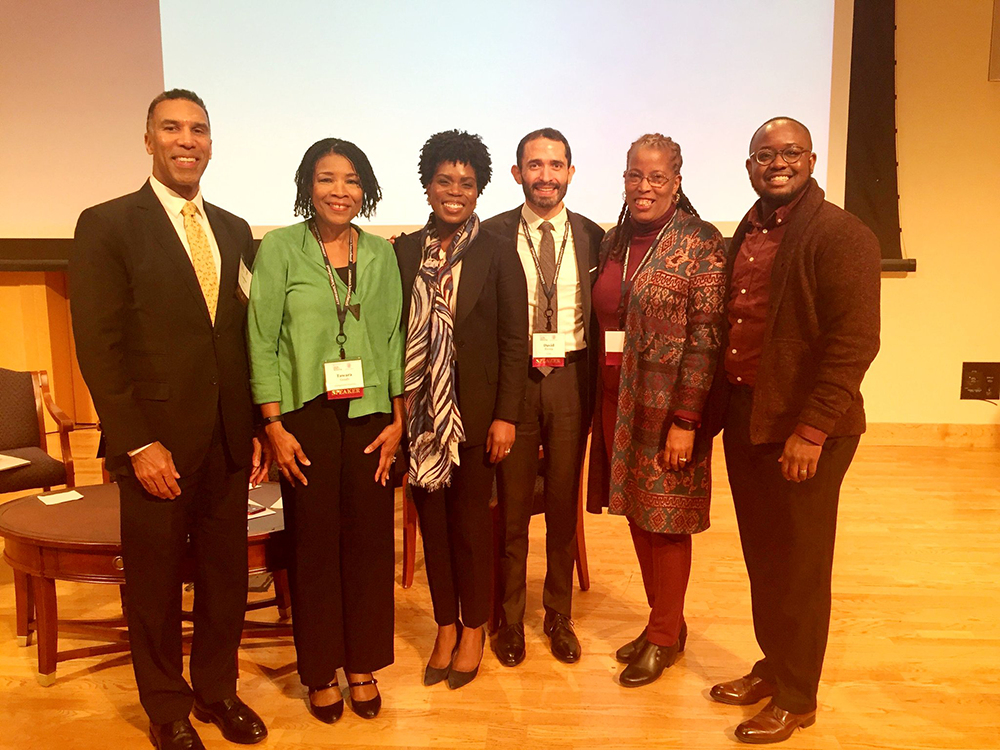The Steve Fund, an organization advocating for mental health support for people of color, held its Young, Gifted & Advancing conference at Georgetown University on Nov. 1 to discuss how to address challenges in addressing the mental well-being of students of color on college campuses.
The daylong conference, which included a keynote session and two breakout sessions, focused on the role of institutions and peer relationships in creating inclusive environments for supporting university students of color affected by mental health issues. The conference, which was organized through the Office of the President, held several panels ranging in topics from the role of faculty in supporting mental health to the influence of intersectional identities on mental well-being.

Microaggressions, which are unintentional or intentional phrases that send a derogatory message, are mental health obstacles students of color face while navigating their college experiences, according to panelist and associate professor of nursing Edilma Yearwood.
“I think racial bias across one or more environments serve as microaggressions, which over time is caustic and detrimental to health, self-esteem and self-confidence,” Yearwood wrote in an email to The Hoya. “Marinating in these feelings over time creates doubt and wears down any initial excitement and hope of success in college, especially in primarily white environments.”
The Young, Gifted & Advancing conference was the seventh conference in the Steve Fund’s Young, Gifted & @Risk series and the first to be held at Georgetown. The series will also include conferences in the fall at the University of Michigan and the City University of New York.
Attendees received a pamphlet at the conference titled “The Equity in Mental Health Framework,” which lists 10 strategies to bridge the gap between students of color and mental health services. The strategies include recruiting and training a diverse body of faculty, offering workshops on mental health services and creating discussion groups dedicated to promoting mental well-being resources for students.
The Equity in Mental Health Framework provides leaders and allies with strategies to better provide equitable access to resources for college students, according to Deidra Dain, senior advisor for programs for The Steve Fund.
“University leaders and stakeholders can use it to make proactive decisions – based on their unique campus needs and conditions – to improve racial climate, prioritize student mental and emotional health, and foster a thriving learning environment,” Dain wrote in an email to the Hoya.
In addition to the breakout sessions, the conference also included keynote speakers Sherry Molock, associate professor of clinical psychology at The George Washington University, and David Rivera, associate professor at Queens College, City University of New York. Molock and Rivera spoke in a session titled “Macro and Micro Climates: Challenges to and Protectors of Mental Health for Students of Color.”
The conference highlighted the importance of recognizing the distinct barriers marginalized groups face to accessing mental health treatment, such as provider bias and stigma, according to conference panelist and LGBTQ Resource Center Director Shiva Subbaraman.
“Many students who face mental health challenges also face further barriers to access and to belonging if they come from other marginalized identities,” Subbaraman wrote in an email to the Hoya. “We all have a right to be taken seriously; to be validated; to be seen; to feel secure; and to feel engaged.”
At Georgetown, the university’s Counseling and Psychiatric Services offer individual services, group therapy and workshops to the student body. In 2018, the university contributed $10,000 toward a student-run pilot program of off-campus therapy stipends for students demonstrating financial need.
While the university has made efforts to improve mental health resources through CAPS, faculty engagement with programming needs to increase, according to conference panelist and Georgetown associate professor of biology Heidi Elmendorf.
“My critique of the current situation is simple, though not easy,” Elmendorf wrote in an email to the Hoya. “We need to ensure that more faculty take part in the programs we already offer, that we incorporate participation into our expectations of faculty.”
The Office of the President’s sponsorship of the conference brings hope to the idea that the issues students of color face at Georgetown will be properly addressed in the future, Subbaraman wrote.
“I think the day-long conference both highlighted the enormity and prevalence of this issue across the country; and since it was held in conjunction with the Office of the President, we hope this will bring a lot of more understanding,” Subbaraman wrote in an email to The Hoya.




















